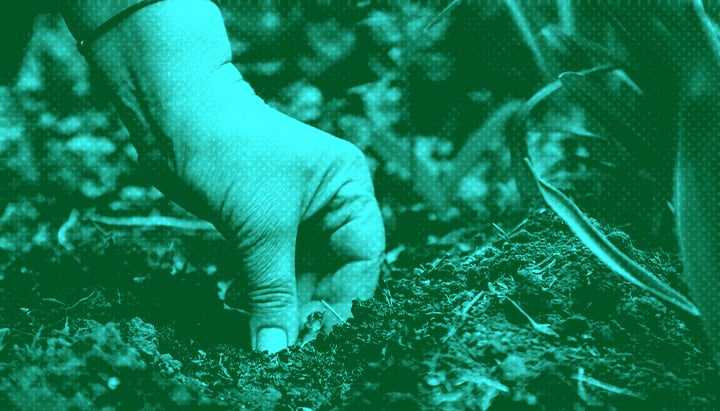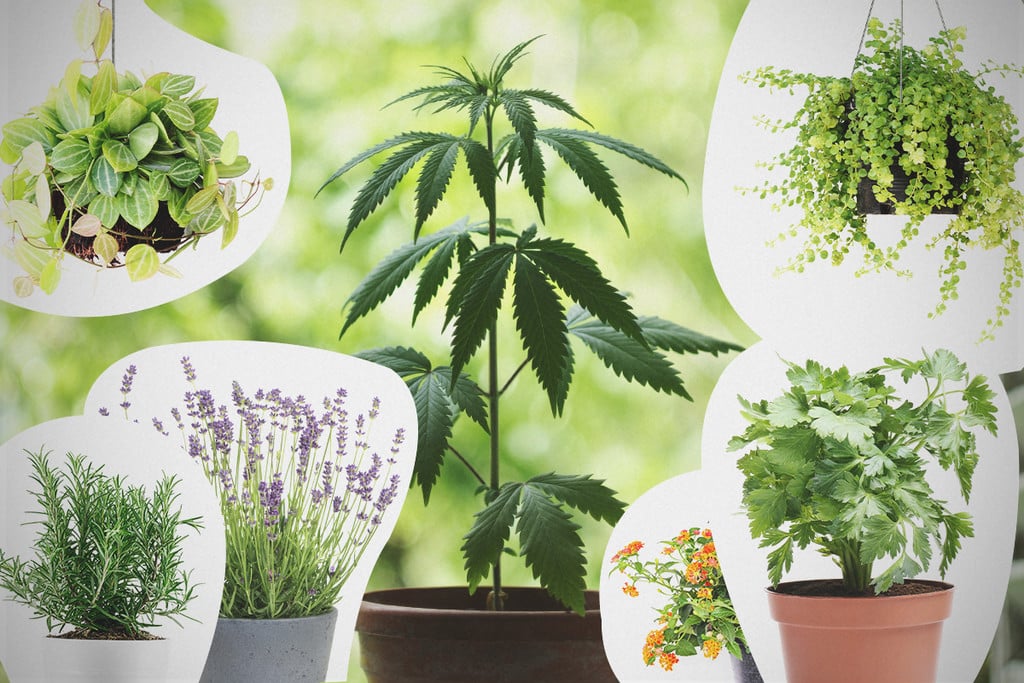.

Plant Therapy: The Benefits of Cannabis Gardening
Hanging out with plants is very beneficial to the mind, body, and soul. Here, we investigate exactly how getting out in the garden can benefit you, and how to combine plant therapy with an abundant cannabis grow.
Gardening is good for you—really good for you. It has long been known that getting outside and moving gently has numerous benefits, and now there is more and more research coming out that backs this up.
In this article, we look at the very many benefits of gardening, and how you can incorporate cannabis into your garden and benefit from growing these plants too!
Contents:
What Is Plant Therapy?
Plant therapy isn’t so much a prescribed medical practice, but rather the name given to the benefits of simple gardening. That being said, there are some instances in which people are deliberately encouraged to practise horticulture in order to improve their mental well-being, such as in psychiatric hospitals.
For the purposes of this article, though, the term “plant therapy” refers to the joys and treasures of simple gardening.
Plant therapy doesn’t involve any specific medical techniques. Simply getting out in the garden and tending to your plants—watering, feeding, pruning, or even just wandering about and checking on them, all count as plant therapy, along with more involved processes such as planting and harvesting.


Are Home Gardening and Plant Therapy the Same?
Given the above, we can say that, yes, gardening and plant therapy are the same. Arguably, all gardening has some therapeutic benefit—be it mental, physical, or both. Technically, plant therapy needn’t be home gardening, but simply gardening, as it could also take place in an institution such as a school or hospital, or at a shared garden such as an allotment.
The Benefits of Plant Therapy and Home Gardening
Gardening is known to have a wide range of benefits. From mental health benefits to longevity, lower rates of loneliness, and much more, there is good reason for almost anyone to start some form of gardening.
1. Physical Health
There are a slew of physical health benefits related to gardening. Primarily, these are a consequence of getting outside and moving. While gardening may not be the most intensive physical activity available, it is a consistent practice and has cathartic qualities that other forms of exercise may lack. In fact, it has been shown that high-intensity exercise, such as running and cycling, is not necessary to gain the benefits of aerobic exercise[1].
What’s more, the physical side of gardening can be more involved, involving raking, digging, carrying large bags of soil, and so on. If you have a large outdoor garden, then the possibilities for more intense physical exertion are there.
What’s more, it has been shown that sunlight, and subsequent vitamin D production, can help to lower blood pressure[2]. This eases strain on the heart and blood vessels, and helps to reduce stress and generally improve quality of life.
As plants grow and you tend to them, then gardening can also help to improve dexterity and fine motor skills, alongside working the heart, lungs, and larger muscles.
2. Mental Health
Gardening, and more generally being out in nature, are well-known to have a range of positive effects on mental health, which in turn can also impact physical well-being.
It has been shown that regular gardening reduces stress, symptoms of depression, and mood disturbance[3]. There are thought to be several reasons for this.
First, exposure to plants and even the colour green is thought to immediately make people feel calmer. When people have regular access to green spaces, then mental health appears to improve significantly.
Moreover, studies indicate that people who regularly get outside in nature (this includes gardening) have a significantly lower chance of developing dementia[4] compared to those who don’t.
3. Greater Knowledge of Nature
It’s not all about your health!
Gardening teaches you about nature. It teaches you the names and characteristics of various flora, and also helps you to understand the fauna that lives alongside it in your garden.
Often, this knowledge becomes much greater than knowing the names of a few plants and insects. Rather, over time, you will begin to develop an understanding of the ecosystem of your garden and how the whole network of nature actually coexists.
4. Socialising
Some choose to garden alone, and this still has manifold benefits. But for others, such as those gardening in allotments, there can also be a social aspect to it too. Sharing a task and working alongside others is great for mental well-being and helps to combat loneliness.
Greater exposure to social contacts has been shown to be one of the major benefits of gardening.


Why Is Gardening Therapeutic?
It’s clear that gardening is therapeutic in many ways, but why is this? Why is gardening good for you? In the following section, we’ll explore why gardening might be good for the body and mind, as opposed to, say, going for a run.
🧘 Mindfulness
Gardening is a slow and mindful exercise. It doesn’t involve forcing anything or rushing, but rather moving slowly. Moreover, the results are not immediate, instead taking anywhere from months to years to complete, making it a very patience-heavy activity.
Gardening, while relaxing, is simultaneously very stimulating for the senses, albeit in a gentle manner. You feel the wind, rain, and sun on your skin, and this is ever-changing. You also feel cool, damp soil in your hands and the texture of wood and leaves. In most of our lives, we are deprived of natural sensory stimulation such as this.
All of this comes together to make gardening a very grounding and present activity. Taking yourself out to the garden regularly helps you to step away from the stresses of the past and future, and instead embrace the moment in a natural environment.
🧚 Connection to Nature
We shouldn’t underestimate how important it is to spend time in nature—even if that patch of nature is very small, perhaps even just a pot on a balcony.
The benefits of nature don’t just come from epic mountain ranges. It’s got a lot more to do with connection. We humans are, though we might forget it, parts of the natural world—though most of the time we feel disconnected from this.
Working with plants helps us to reconnect a little with our animal selves, and it’s hard to overestimate how beneficial this can be.
🫂 Caring for Another Being
On that note, gardening encourages a sense of empathy with the natural world too. If you garden, you will genuinely grow to care for and love the plants you are growing. The green companionship is comforting and good for the mind and soul.
The Benefits of Cannabis Gardening
It’s easy to think of cannabis plants as entirely separate from the normal garden. But in essence, there’s little difference between growing cannabis plants and apple trees.
Therefore, we can take all of the information above and apply it to cannabis gardening, especially if growing outdoors. Growing indoors in a foil-lined tent can mitigate many of the above benefits. But growing outdoors or in a greenhouse can be very therapeutic.
How to Incorporate Cannabis Gardening Into Home Gardening
So, if you want to grow cannabis, and you also want the process to benefit your mental and physical health, here are some tips!
- Grow companion plants: Growing a variety of different plants will increase the benefits of plant therapy, improve the beauty of your garden, and help to protect and disguise your cannabis plants.
- Check on your plants on a daily basis: Learn to love and care for your cannabis plants. Check on them at least once a day, and do it carefully. Inspect every leaf, and notice how they’re growing. Observing plants on a daily basis can be fascinating, so enjoy it!
- Make your own soil: Getting your hands dirty in soil is very liberating. So make your own soil for your cannabis plants, rather than buying it. Your plants will thank you for it.
- Water them based on need: Don’t just water your plants once every x number of days, but rather take your cues from the plants and the soil. This will help you better understand the needs of your plants, and it will benefit them too. Water only when the top couple of centimetres of soil is dry to the touch.


Home Gardening: Improve Your Well-Being
As you can see, home gardening is seriously good for you. And don’t think that you need an expansive garden to reap the rewards. In fact, a house plant on a windowsill is enough to make a difference. But if you can get outdoors, then this is even better!
Cannabis can absolutely be incorporated into a home garden and used as plant therapy—don’t think of it as something entirely different. So, if you like weed and fancy all of the goodness listed in this article, why not plant some cannabis seeds in your garden?
- Gardening for health: a regular dose of gardening - PMC https://www.ncbi.nlm.nih.gov
- Associations of Blood Pressure, Sunlight, and Vitamin D in Community-Dwelling Adults: The Reasons for Geographic and Racial Differences in Stroke (Regards) Study - PMC https://www.ncbi.nlm.nih.gov
- A pilot randomized controlled trial of group-based indoor gardening and art activities demonstrates therapeutic benefits to healthy women | PLOS ONE https://journals.plos.org
- Lifestyle factors and risk of dementia: Dubbo Study of the elderly - PubMed https://pubmed.ncbi.nlm.nih.gov





































